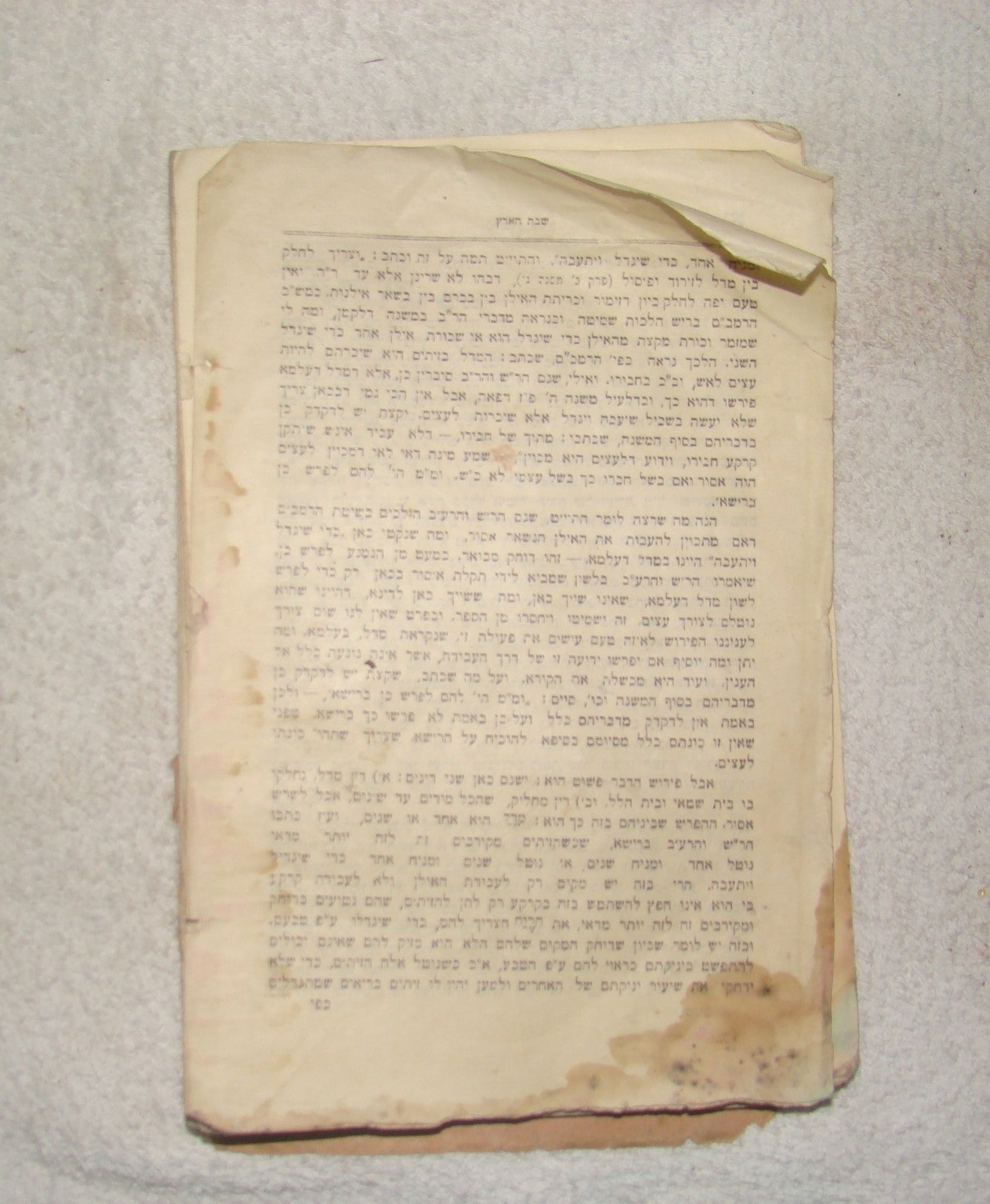1
/
of
11
IsraelPalestineHistory
Book Jewish Judaica 1910 Chief Rabbi KOOK SHABAT HA'ERETZ 1st Edition Jerusalem
Book Jewish Judaica 1910 Chief Rabbi KOOK SHABAT HA'ERETZ 1st Edition Jerusalem
Regular price
$438.90 USD
Regular price
Sale price
$438.90 USD
Quantity
Couldn't load pickup availability
Jewish Judaica 1920 Chief Rabbi KOOK Book OROT 1st Edition Jerusalem RARE
Cover of the book "The Land of the Land, Hilchot Shevi'it" written by Rabbi Avraham Yitzchak HaCohen Kook. The book deals with the Sabbatical year and aroused a fierce debate as soon as it was published in 1910.
Rabbi Kook published the book in his capacity as rabbi of the city of Jaffa and the moshavot, where he expounded his views on the controversial issue of that year: agricultural work during the Shemitah year. The main argument was that the days were the days when the first agricultural settlements in the Land of Israel flourished. The new settlement in Israel was able to withstand the difficulties of the hot climate, the diseases, the hostility of the Turkish government and the old Yishuv - and succeeded in planting roots in Israel. At that time, the colony of Petah Tikva expanded and six more moshavot were established: Rishon Letzion, Ekron, Nes Tziona, Gedera, Rosh Pina, Yesod HaMa'ala.
Then came the Sabbatical year, the seventh year in every cycle of the Jewish calendar, the year in which there is a Torah commandment to stop the work of the land for twelve months.
The farmers, the new settlers in Israel, claimed that fulfilling the mitzvah of shmita would exact a high economic price that would bring about the destruction of the independent Jewish community. In addition, the officials of the Zionist philanthropist Baron Rothschild, who assisted and supported the Jewish Yishuv at the time, demanded that the farmers continue the work of the land, and threatened that if the work ceased, the monthly allowances would be canceled.
On the other hand, members of the old Yishuv claimed that thanks to the mitzvah of shemittah, the land of Israel was blessed, and failure to fulfill the commandment would damage the sanctity of the land and stain those who dwell in it.
In his book, "Shabbat HaAretz, Hilchot Shvi'it," Rabbi Kook declared that he had decided to permit the cultivation of the land during the current sabbatical year (1910) under certain halakhic conditions.
Rabbi Kook's halakhic decision was based on a number of reasons, and the main point was that the cancellation of the work of the land would inflict a mortal blow on agriculture in the Land of Israel. In fact, Rabbi Kook accepted the claim of the moshavim.
Publication of the book led to harsh reactions. On the one hand, the ultra-Orthodox world, members of the old Yishuv, were horrified by the cancellation of the Seventh Commandment. On the other hand, most of the farmers in the new settlement, most of whom are not religiously observant, did not wish to honor the halakhic restrictions set by Rabbi Kook for agricultural work. Rabbi Kook was even forced to stand against the bureaucracy of philanthropist Baron Rothschild, who demanded that the peasants ignore the instructions of the rabbi of the moshavot if they wished to continue receiving financial support.
The cover picture shows that it is not just the author who signs: "Work for a holy people who dwell in holy land." Rabbi Kook felt great admiration for the settlers. After thousands of years of exile they settled in the Land of Israel, broke the land, guarded and toured the fields - all these were in the eyes of the Rabbi clear signs of the era of redemption.
In this book we are exposed to an example in which Halakhah has been softened in light of what is happening in reality.
SHABAT HA'ERET- HILCHOT SHVIIT: 110pp
Kontras Aharon : 24pp, maybe missing some pages.
* cover is not attached
for condition watch photos
Share























